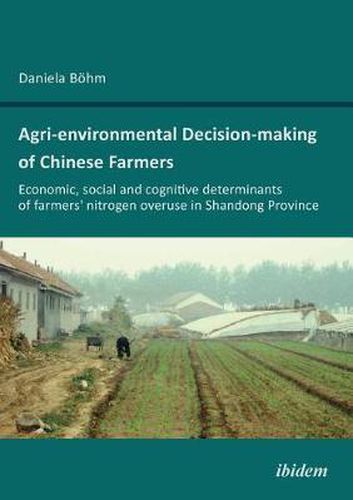Readings Newsletter
Become a Readings Member to make your shopping experience even easier.
Sign in or sign up for free!
You’re not far away from qualifying for FREE standard shipping within Australia
You’ve qualified for FREE standard shipping within Australia
The cart is loading…






This title is printed to order. This book may have been self-published. If so, we cannot guarantee the quality of the content. In the main most books will have gone through the editing process however some may not. We therefore suggest that you be aware of this before ordering this book. If in doubt check either the author or publisher’s details as we are unable to accept any returns unless they are faulty. Please contact us if you have any questions.
Over the past 30 years, China’s intensive agricultural production and nitrogen overuse has led to significant environmental problems. Moreover, farmers face uncertainty regarding better technologies since they are risk-averse due to the experiences they have made in the past. Thus, the challenge to overcome is to implement well-grounded approaches that accomplish effective agricultural training, encouraging farmers to adopt optimised practices. Since, in addition to economic concerns, successful local policy implementation is closely related to an individual’s social and cognitive preferences, the approach of this study was to link the socio-psychological theory to the economic model of individual behaviour. Tailored to the Chinese context, in particular farmers’ agri-environmental attitudes, their fundamental value positions and personal guanxi relationships are focussed in order to show how the mental decision-process is related to the cultural, institutional and historical context.Empirical evidence was gained by a comprehensive survey in Shandong Province. The results provide an overview of the economic, environmental and structural situation of Chinese agriculture. Besides excessive nitrogen overuse and low production efficiencies, decreasing profitability reveals the poor environmental and economic situation of small-scale farms. As a result of increasing opportunity costs for labour, in particular of young family members, farms diversify their income strategies. Overall, Chinese agriculture lacks better structural conditions and future perspectives as well as the support of effective extension systems with well-educated trainees. Hence, policy recommendations are proposed in the fields of education, political incentives and institutional reforms, challenging a new agricultural paradigm for China.
$9.00 standard shipping within Australia
FREE standard shipping within Australia for orders over $100.00
Express & International shipping calculated at checkout
This title is printed to order. This book may have been self-published. If so, we cannot guarantee the quality of the content. In the main most books will have gone through the editing process however some may not. We therefore suggest that you be aware of this before ordering this book. If in doubt check either the author or publisher’s details as we are unable to accept any returns unless they are faulty. Please contact us if you have any questions.
Over the past 30 years, China’s intensive agricultural production and nitrogen overuse has led to significant environmental problems. Moreover, farmers face uncertainty regarding better technologies since they are risk-averse due to the experiences they have made in the past. Thus, the challenge to overcome is to implement well-grounded approaches that accomplish effective agricultural training, encouraging farmers to adopt optimised practices. Since, in addition to economic concerns, successful local policy implementation is closely related to an individual’s social and cognitive preferences, the approach of this study was to link the socio-psychological theory to the economic model of individual behaviour. Tailored to the Chinese context, in particular farmers’ agri-environmental attitudes, their fundamental value positions and personal guanxi relationships are focussed in order to show how the mental decision-process is related to the cultural, institutional and historical context.Empirical evidence was gained by a comprehensive survey in Shandong Province. The results provide an overview of the economic, environmental and structural situation of Chinese agriculture. Besides excessive nitrogen overuse and low production efficiencies, decreasing profitability reveals the poor environmental and economic situation of small-scale farms. As a result of increasing opportunity costs for labour, in particular of young family members, farms diversify their income strategies. Overall, Chinese agriculture lacks better structural conditions and future perspectives as well as the support of effective extension systems with well-educated trainees. Hence, policy recommendations are proposed in the fields of education, political incentives and institutional reforms, challenging a new agricultural paradigm for China.